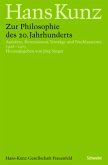Ludwig Wittgenstein and Martin Heidegger are two of the most important--and two of the most difficult--philosophers of the twentieth century, indelibly influencing the course of continental and analytic philosophy, respectively. In Groundless Grounds, Lee Braver argues that the views of both thinkers emerge from a fundamental attempt to create a philosophy that has dispensed with everything transcendent so that we may be satisfied with the human. Examining the central topics of their thought in detail, Braver finds that Wittgenstein and Heidegger construct a philosophy based on original finitude--finitude without the contrast of the infinite. In Braver¿s elegant analysis, these two difficult bodies of work offer mutual illumination rather than compounded obscurity. Moreover, bringing the most influential thinkers in continental and analytic philosophy into dialogue with each other may enable broader conversations between these two divergent branches of philosophy.
Hinweis: Dieser Artikel kann nur an eine deutsche Lieferadresse ausgeliefert werden.
Hinweis: Dieser Artikel kann nur an eine deutsche Lieferadresse ausgeliefert werden.







